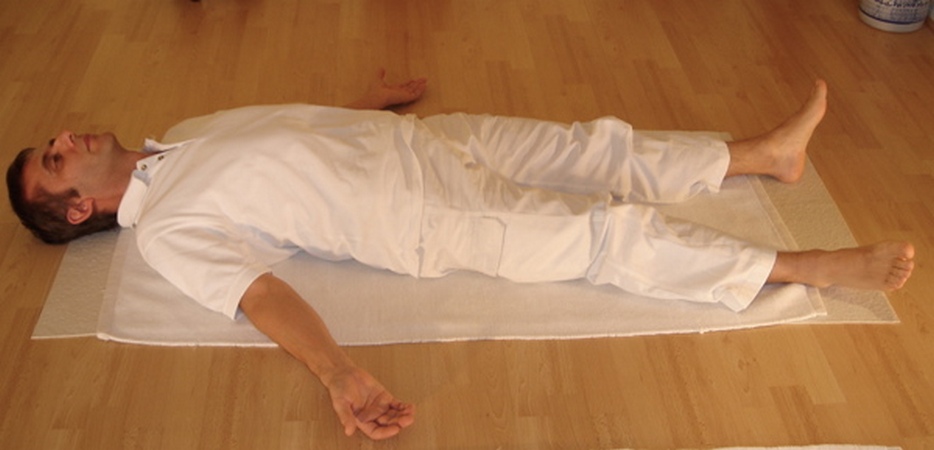Photographs: Abhisek Sarda/Wikimedia Creative Commons Shameem Akhtar
Shameem Akthar, yogacharya trained with the Sivananda Vedanta Yoga Center, lists the benefits of meditation.
Most health articles and professionals in the field suggest meditation as a great complement to any form of treatment or therapy to control an ailment. Many progressive hospitals around the world, including now in India, have started offering meditation sessions to patients under their care.
How as a practice that till now been suspiciously viewed as a spiritual one suddenly acquired mainstream medical status? It not difficult to hazard a guess: several researches around the world have checked out the benefits of meditation. Perhaps part of this has to do with the fact that meditation goes into the root cause of sickness and deals it from that level.
For meditation/dhyana to affect you positively, it must be done daily, for around the same duration. The same form of meditation must be attempted each time: eg breath-watching, prayer recitation, guided visualisation, audio tapes or following transcripts either over the tape or in the mind.
Ideally even this should not be self-prescribed but suggested by a qualified expert in this field. Other practices that come close to conventional meditation and may be used as great substitutes are neurolinguistic programming and hypnosis.
Stress control
Image: Stress is one of the most common 'ailments' of modern times and neditation has proved to be the most definitive tool towards stress controlPhotographs: Dadang Tri/Reuters
The main reason that meditation has acquired cult status is because it is the most definitive tool towards stress control. Though initially a stressed personality is likely to find sitting still for meditation more stressful, in the long run it will help deal with the inner triggers that makes one highly reactive. In turn, it will help reduce the chances of diseases that attack a personality prone to stress, such as heart ailments.
Blood pressure
Image: The relaxing practice of yoga nidra is tremendously helpful for patients of blood pressurePhotographs: Joseph Renger/Wikimedia Creative commons
Different types of meditation can affect blood pressure spikes positively. In the case of low blood pressure more stimulating and mind-engaging dhyana such as antar mouna (inner silence meditation) may be attempted. In high blood pressure the relaxing yoga nidra (sleep of yoga) or breath watching (apanasana) may be attempted. In either case, in just a few weeks positive results will show how powerful meditation is and how it affects the flow of your blood and its rate in your body.
Digestive disorders
Image: Among other things, meditation also helps control digestive tract problems that are in fact psychosomaticPhotographs: Courtesy Shilpa'sYoga/Used for representational purposes only
In acute digestive problems including acidity, irritable bowel syndrome, ulcers etc, meditation can help control the emotional triggers that cause these problems. Some of the digestive tract problems are psychosomatic, which means they are likely to be triggered by emotional reactions. Meditation helps to control it at the root level.
Depression
Image: Meditation also helps deal with depression or low esteemPhotographs: Andrew Mason/Wikimedia Creative Commons
It can help deal with depression or low esteem. For this, as with low blood pressure, the more engaging practices like antar mouna are ideal. Guided meditation and visualisation with audio tapes can also help remove and bring to surface the hidden causes of depression.
Immune system boost
Image: Meditation can also help in boosting immune systemPhotographs: Athit Perawongmetha/Reuters
Amongst the earliest researches on meditation done on medical students found that the T-cell (a type of immune cell) levels went up in those who meditated. Their saliva also contained more traces of immune cells and they were better able to deal with the stress of the exams than their non-meditating counterparts.
Healing
Image: Meditation helps deal with the body's healing mechanismPhotographs: Sivaram V/Reuters
The most amazing impact of meditation has been its influence on the body's healing mechanism as a whole. In chronic ailments and recovery from major operations meditation has been found to boost recovery and healing faster. The exact cause of this is not known, though the results are dramatic enough to suggest that meditation works.
In pregnancy and other women's health issues
Image: The pain-bearing ability of pregnant women is seen to be higher than those who did not meditatePhotographs: Susana Vera/Reuters
Pregnant women who meditated were found to have easier delivery. Their pain-bearing ability also was seen to be higher than those who did not meditate. Meditation also improved the lactation of the women. In women who had problems with fertility, meditation was found to improve the chances of conception.
Learning skills
Image: Brain scans of meditating monks have shown how brain areas dealing with language and logic 'light up' during deep meditation.Photographs: Chaiwat Subprasom/Reuters
Yoga nidra is said to be a powerful tool in boosting memory. There are fabulous tales of yoga gurus who have learnt ancient texts completely by having it played in the background as they meditated. This could be because in meditation the mind achieves the alpha brain wave pattern where the mind is both relaxed and alert. Brain scans of meditating monks have shown how brain areas dealing with language and logic 'light up' during deep meditation.
Anger control and ability to deal with emotional yo-yos
Image: Meditation is used in controlling extreme impulsesPhotographs: Film still of Anger Management starring Jack Nicholson (L) and Adam Sandler
Meditation is known to improve natural intuitive levels and impulse control. It may explain why it is used even in weight loss programmes to deal with emotional binge eating. It is used in controlling extreme impulses that can trip a person in life. It is in this fashion it can help boost self-esteem, which explains why hypnosis, which is also a form of meditative practice, is used to break a destructive pattern of thinking.
In addiction control
Image: Meditation helps you control your addictionsPhotographs: Eliseo Fernandez/Reuters
For the same above reason, meditation is a serious part of any programme to control addictions. It engages all the senses and thus gives a high which replaces the high that addicts seek through external stimuli. Again, research has shown that areas of the brain light which are similar to what we may experience on a pleasant day.












Comment
article